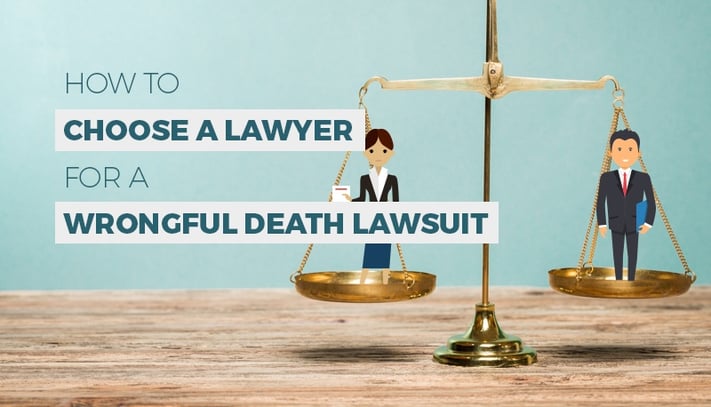How to Choose a Lawyer for a Wrongful Death Lawsuit

Losing a loved one is always painful, but when the loss is due to someone else's greed, negligence, incompetence, or malice, the pain stings more sharply, and the anger can be overwhelming. You are not alone. Wrongful death lawsuits are not uncommon, with nearly 40,000 people dying in auto accidents alone each year. Assaults, medical error, falls, and negligence-related injuries also drive up the death toll.
If someone you love has died due to someone else's error, you do not have to sit passively by and hope for life to get better. Though money will not bring your loved one back, it is often a necessary part of the process of moving forward. A lawsuit also sends a strong message to the person who harmed your loved one, and may help prevent future accidents from claiming the life of another person's beloved friend or family member.
Before you sue, you need to ensure you have chosen a lawyer who specializes in the issues associated with your case. The first lawyer you meet is not always that person. Here's how to choose the right wrongful death lawyer for your case.
Finding Your Lawyer
Don't base your search wholly on Google, or rely solely on lawyer referral sites. Lawyers pay to be on advertising referral sites, and their high ranking or excellent rating does not necessarily mean he or she is uniquely qualified for the job. Instead, try one of these sources:
- Contact your local bar association and ask for a list of lawyers who specialize in wrongful death suits.
- If you are working with a medical provider, ask him or her for a referral to a wrongful death lawyer his or her other patients have used and liked.
- If a friend has sued someone for wrongful death, personal injury, or medical malpractice, ask for a referral to that lawyer—but only if the friend liked the lawyer.
The Importance of Experience
A lawyer can have 30 years of experience and still be totally unqualified to take your case. What matters is that he or she has dedicated his or her career to working on the specific area of law relevant to your case. If your loved one died in a car accident or assault, you need a personal injury lawyer. Medical malpractice attorneys specialize in deaths and injuries that doctors cause. To determine whether your lawyer is sufficiently experienced:
- Read his or her website to see which types of cases he or she discusses the most.
- Google your lawyer. Do the news stories and reviews you find pertain to cases like yours?
- Ask your lawyer how many cases like yours he or she has taken, and what the outcome has been.
Reputation in the Community
Excellent lawyers steadily eke out stellar reputations. If another lawyer refers you to someone, that's usually a great sign. If multiple people refer you to the same lawyer, that's even better. Of course, the best lawyers aren't always the most well-known. Indeed, an attorney who dedicates half of his or her time to getting on the news has less time to spend with clients. Don't allow yourself to be distracted by bluster or by frequent media appearances. Instead:
- Read online reviews. Some good lawyers might not have any reviews at all, but if you find reviews, make sure there's no a theme of false promises or abandoning clients.
- Check with your state bar association to ensure your lawyer has not been disciplined for professional misconduct.
- Contact local courts to determine whether your lawyer has ever been sued for malpractice.
- Ask your lawyer if you can speak to references. If he or she has a successful track record, odds are good there are dozens of clients just waiting to gush.
- If you have lawyer friends, ask them if they know of or have heard about your lawyer.
Involvement With the Issues
The law can change on a dime. A Supreme Court ruling has the power to radically upend lives, as evidenced by the U.S. Supreme Court's recent ruling allowing gay marriage. Good lawyers aren't just those who had a big win five or 10 years ago. Instead, the best litigators stay on top of the law for the entirety of their careers. Ask your lawyer:
- How he or she stays up to date on the law.
- Whether there are any new legal precedents that might affect your case.
- Whether he or she is involved in any local bar associations or advocacy organizations.
Gut Feelings and the Preliminary Interview
You can't judge an attorney's legal acumen by his or her demeanor, or by how you feel after a single conversation. You can, however, determine whether this is the sort of person with whom you would like to work. You know yourself and your needs best, so trust your gut. Then ask the following questions:
- How frequently should I expect to speak to you?
- Is it better if I contact you via email or phone?
- What can I do to help you win my case?
- What is your ideal client like?
- What are my odds of winning?
- What would be a fair, favorable settlement?
- How long will it take to settle or litigate my case?
- What are the weaknesses and strengths of my case?
- Have you ever litigated a case with similar facts to mine?
- Will anyone else, such as a paralegal or secretary, be working on my case?
Legal Skill
The law is a complicated thing, and many issues will be litigated long before you see the inside of a court room. Legal skill matters, and you should listen to your lawyer's advice, rather than forcing him or her to take the approach you prefer. Some questions to ask include:
- What specific legal arguments will we be making?
- Are there immunity issues?
- What is the value of my case? What would increase or decrease its value?
- Are there any potential grounds on which my case could be dismissed?
- Who all will we be suing, and why? Is there any party whom you think we should not sue?

Stay Updated on Advancements On Traumatic Brain &
Spinal Cord Injuries
About the Author




